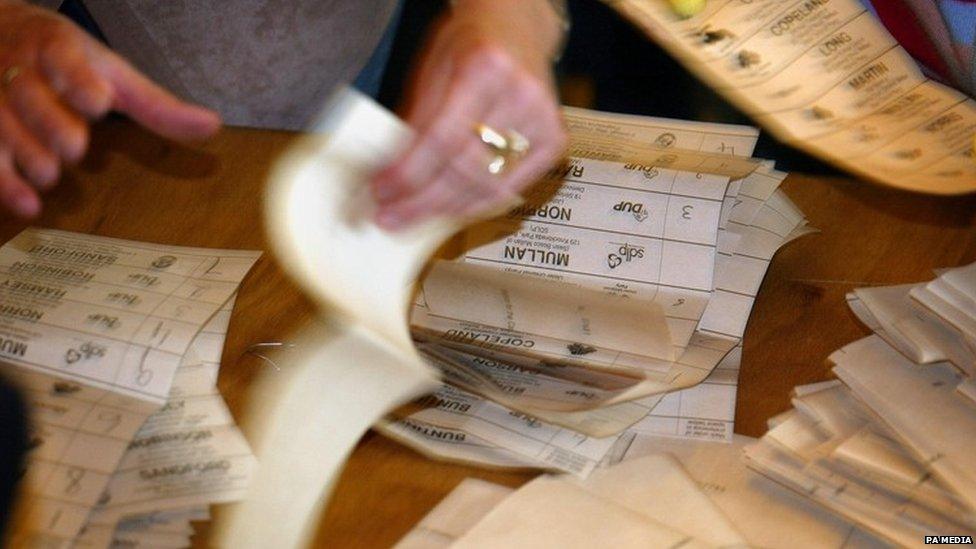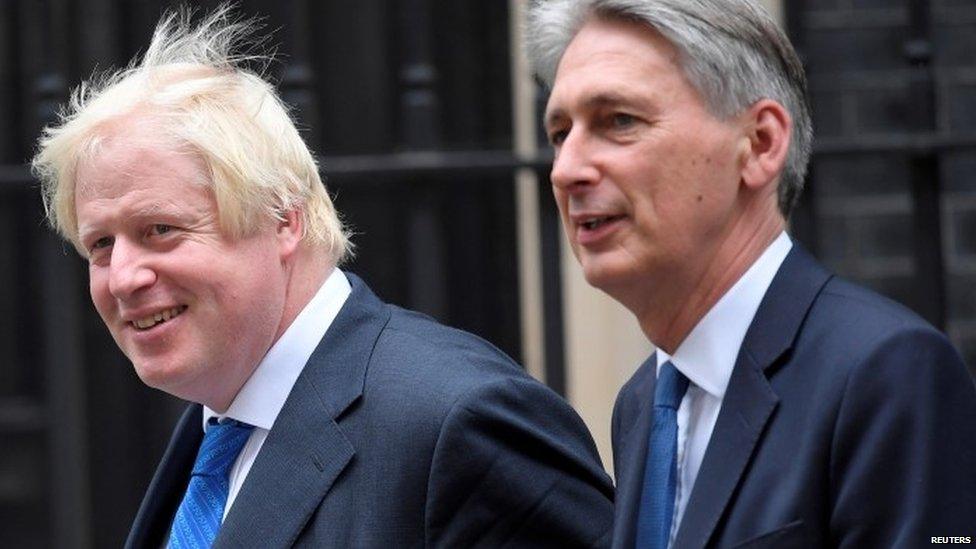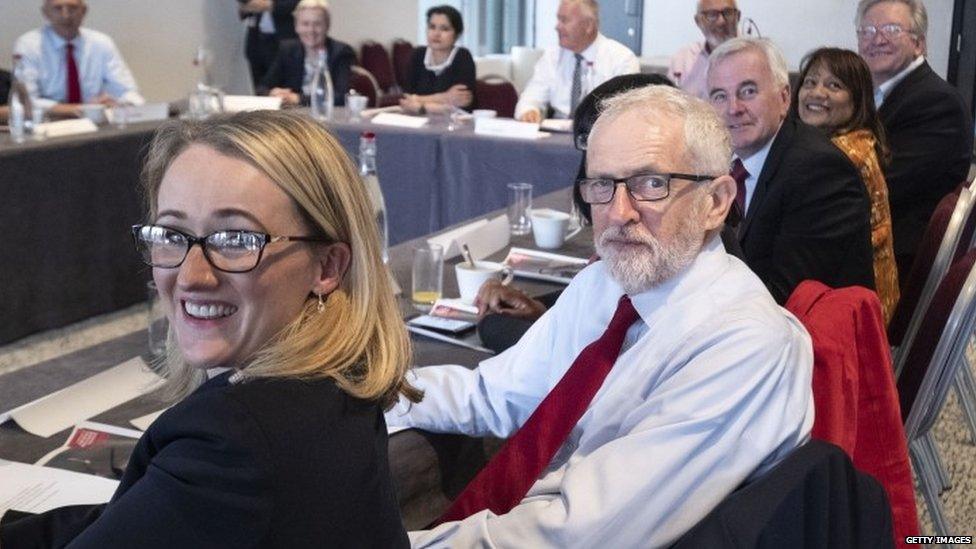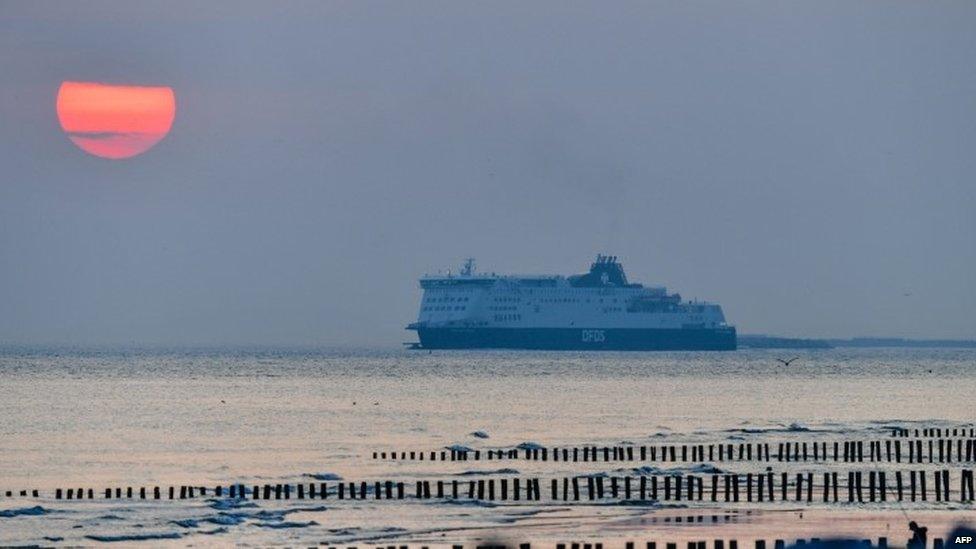Brexit's most important week? Five things that happened on Monday
- Published
We've begun another high-stakes week for Brexit.
Things are changing constantly, but here are the five most newsworthy things that have happened so far on Monday.
1) Boris Johnson's podium moment
Boris Johnson: "I don't want an election, you don't want an election"
It's five weeks since Boris Johnson first appeared outside Downing Street as prime minister.
Today, he was back behind the famous podium and keen to trumpet what he said were his new government's achievements and ambitions on health, education and the economy.
But the real purpose of the brief exercise was to implore his own MPs to back him over Brexit and to reject what he said was "another pointless" delay being proposed by Labour.
While there was little or no detail about what the UK was proposing to break the deadlock with the EU, he insisted the chances of a deal were "rising" and MPs would have plenty of time to scrutinise this.
2) Put 14 October in your diary

Could a third election in five years be around the corner?
Speculation grew throughout the day that an election was becoming a real possibility.
An unscheduled cabinet meeting added grist to the rumour mill, while several bookmakers slashed the odds of a poll before the end of the year.
During his Downing Street address, the PM actually said he didn't want an election, but if no deal was taken off the table there would in effect be no point in continuing talks with the EU - the ultimate threat being negated, in his view.
Soon afterwards, Downing Street told journalists the government expected to table a motion to hold a general election on 14 October if MPs opposed to no deal voted to take control of business in the House of Commons on Tuesday.
3) Deselection threat divides Conservatives

In happier times - Boris Johnson and Philip Hammond in 2017
Ahead of all that, the government had upped the ante by threatening to effectively end the careers of some of the most senior Conservatives in the party.
Up to 20 MPs, including a host of former cabinet ministers, were told that if they supported Labour in efforts to block no deal this week, they would have the whip withdrawn.
Not only would this leave them ostracised in Parliament but it would stop them from standing as Conservative MPs at the next election - an election now looming.
It remains to be seen if any MPs will be spooked - but those who've spoken out so far certainly aren't.
Ex-Justice Secretary David Gauke said he would not be intimidated by any "purge", while Work and Pensions Secretary Amber Rudd said opponents of no deal were being unfairly singled out and should be brought "onside", not expelled.
4) A new Brexit deadline?

Labour figures have said any further extension should be as "short as possible"
We've heard a lot in recent days from Labour and rebel Tories about what they don't want - which is for the UK to leave the EU on Halloween without a legal agreement.
But, until now, there has been precious little detail about what they do want.
Allow X content?
This article contains content provided by X. We ask for your permission before anything is loaded, as they may be using cookies and other technologies. You may want to read X’s cookie policy, external and privacy policy, external before accepting. To view this content choose ‘accept and continue’.

Now we know they are contemplating a further delay to Brexit until 31 January 2020.
Under the terms of a bill they hope to fast-track through the Commons in the coming days, a no-deal exit on 31 October would be outlawed unless Parliament agreed to it.
Among other conditions, there would be a new deadline of 19 October for a Brexit agreement to be approved. If not, the PM would have to request a three-month extension from the EU.
Furthermore, if the EU demanded a longer extension, the PM would have to accept that within two days, unless MPs objected.
Even if MPs manage to get a new law though Parliament before it is suspended on Monday, that is not the end of the story.
There is no guarantee the government will abide by it or that the EU will approve another delay without a specific purpose.
5) And meanwhile, across the Channel

The European Commission is considering allowing EU countries to apply for cash to cope with a no-deal Brexit using a special emergency fund.
Officials are working on a plan to classify no deal as a "major disaster", a category normally used to describe destructive natural events such as earthquakes or major floods.
The move would require the approval of EU states and the European Parliament.
Under the proposals being considered by the commission, EU countries would be able to apply for no-deal cash using the EU's solidarity fund.
BBC Brussels reporter Adam Fleming said the plans were expected to be discussed on Monday, and could be formalised at a commission meeting due on Wednesday.